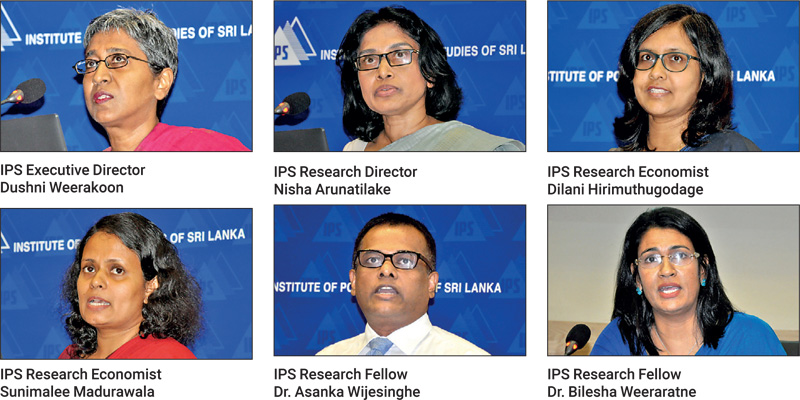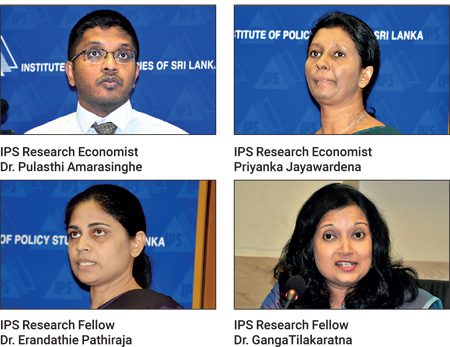Monday Feb 23, 2026
Monday Feb 23, 2026
Thursday, 10 October 2024 03:35 - - {{hitsCtrl.values.hits}}


 By Janani Kandaramage
By Janani Kandaramage
The Institute of Policy Studies (IPS) on Tuesday hosted a knowledge sharing and networking event to launch its annual flagship report ‘Sri Lanka: State of the Economy 2024: Economic Scars of Multiple Crises: From Data to Policy.’
The report analyses the policies implemented to curb the fallout of the 2022 economic crisis-its varying impacts on stakeholders, and the measures taken to aid the financially vulnerable populations of the country through data driven evidence.
IPS Executive Director Dr. Dushni Weerakoon reiterated that despite a 4% rise in GDP growth post the recent crisis, output levels still remain significantly lower than 2018 and 2019 levels.
“The output loss was so significant that it has led to slower job growth, lower living standards, and persistent inequalities to name a few. Can fiscal policy be used to provide relief and recovery? Borrowing in foreign currency can lead to reductions in foreign reserves and will negatively impact debt sustainability. If this occurs, by 2028 when we are expected to make our repayments, we will not have sufficient dollar reserves to make the payment,” she noted.
To prevent such an occurrence, she advocated fiscal austerity measures stating that, “While austerity hurts, but for a country in default, options are very limited and this is the practical way in ensuring the Government’s finances are sustainable in the long-run.”
Dr. Weerakoon also emphasised the country’s constrained policy options in its fragile recovery phase. “Sri Lanka has very limited policy tools to provide relief and boost output recovery,” she noted, stressing that “the more prudent option is to look at ways and means of marginal changes on tax and spending policies to address distributional concerns.”
In this respect, the report’s key findings, using the most recently available data provided a foundation for discussions during the event.
The first session of the seminar was on ‘Distributional and Social Impacts of Policies: Who Gains, Who Loses?’ It featured presentations by research economists Priyanka Jayawardena, Dr. Pulasthi Amarasinghe, and Sunimalee Madurawala. IPS research fellow Dr. Ganga Tilakaratna chaired this discussion.
Jayawardena spoke about the inequity of tax reforms, emphasising that although 95% of the Pay As You Earn (PAYE) and Personal Income Tax (PIT) were borne rather fairly by the richest decile, the VAT burden was greater on low income earners. The poorest groups pay 9 % of their income on VAT while others pay only 6% of their income, suggesting an unfair exploitation of poorer communities.
She called for strengthening tax administrations to effectively prevent tax evasion on PIT which has been widespread in Sri Lanka. She also proposed reducing VAT while raising excise taxes which are deemed more progressive, to compensate for the lost revenue from VAT.
Dr. Amarasinghe described the Aswetha welfare program that replaced the 1995 Samurdhi program, designed to ensure a more accurate cash transfer to the poorer communities using 22 indicators across 6 dimensions including assets, housing, and food consumption to name a few. While acknowledging that the scheme decentivises labour force participation, and does not take into consideration their access to nutritional food, he assured that the programme is continuing to upgrade by adding more indicators such as measuring nutritional content.
Madurawala meanwhile, reflected on the current position of health financing, stating that only 8-9% of public expenditure is allocated to healthcare despite household expenditure on medical services being on the rise since the pandemic. The low-income households are especially hit the worst due to inadequate staffing and hospitals in remote regions. To bridge this gap between urban and rural areas, mobile health clinics, enhanced social health insurance, and target policies aimed at reducing out of pocket spending were recommended.
The second session focused on ‘Skills, Jobs, and Wages: A Low Productivity Trap?’ chaired by IPS research fellow Dr. Bilesha Weeraratne. It featured IPS research fellow Dr. Nisha Arunatilaka stressing the need for quality education in addition to freely available education. By recognising the lack of qualified teachers in public education and inconsistencies in the education ministry as the root causes for 65% of the youth inactive in higher education, she proposed legal reforms for modernising the system through the inclusion of soft skills and financial literacy and using technology as a means of enabling remote learning.
IPS research officer Suresh Ranasinghe, speaking about labour market and quality jobs, emboldened how these educational disruptions during the pandemic and imperfect information on vocational training led to the employment population ratio falling by 4.49% points. Raising public awareness of the many vocational schemes offered by the country in growing sectors like IT can overcome the skill shortage faced by the economy.
IPS research economist Dr. Lakmini Fernando also emphasised how public sector employment fell by 3% between 2018 and 2020 due to immigration as workers sought better wages abroad. Offering competitive salaries and benefits within the public sector can slowly alleviate this brain drain.
The final session, moderated by IPS research fellow Dr. Manoj Thibbotuwa, examined energy pricing and export competitiveness, as well as transforming agriculture for export. Research economist Dr. Erandathie Pathiraja noted the high costs of fossil fuel electricity generation, affirming the need for investment in renewable energies which is both eco-friendly and consumer-friendly. Other research economist Dilani Hirmuth ugodage said diversifying crop production further to spices such as cinnamon and enhancing tea exports can promote export-led growth. However, despite this untapped potential, challenges such as unprecedented weather patterns, and poor mechanisation hinder the agriculture sector from developing further.
Pix by Lasantha Kumara